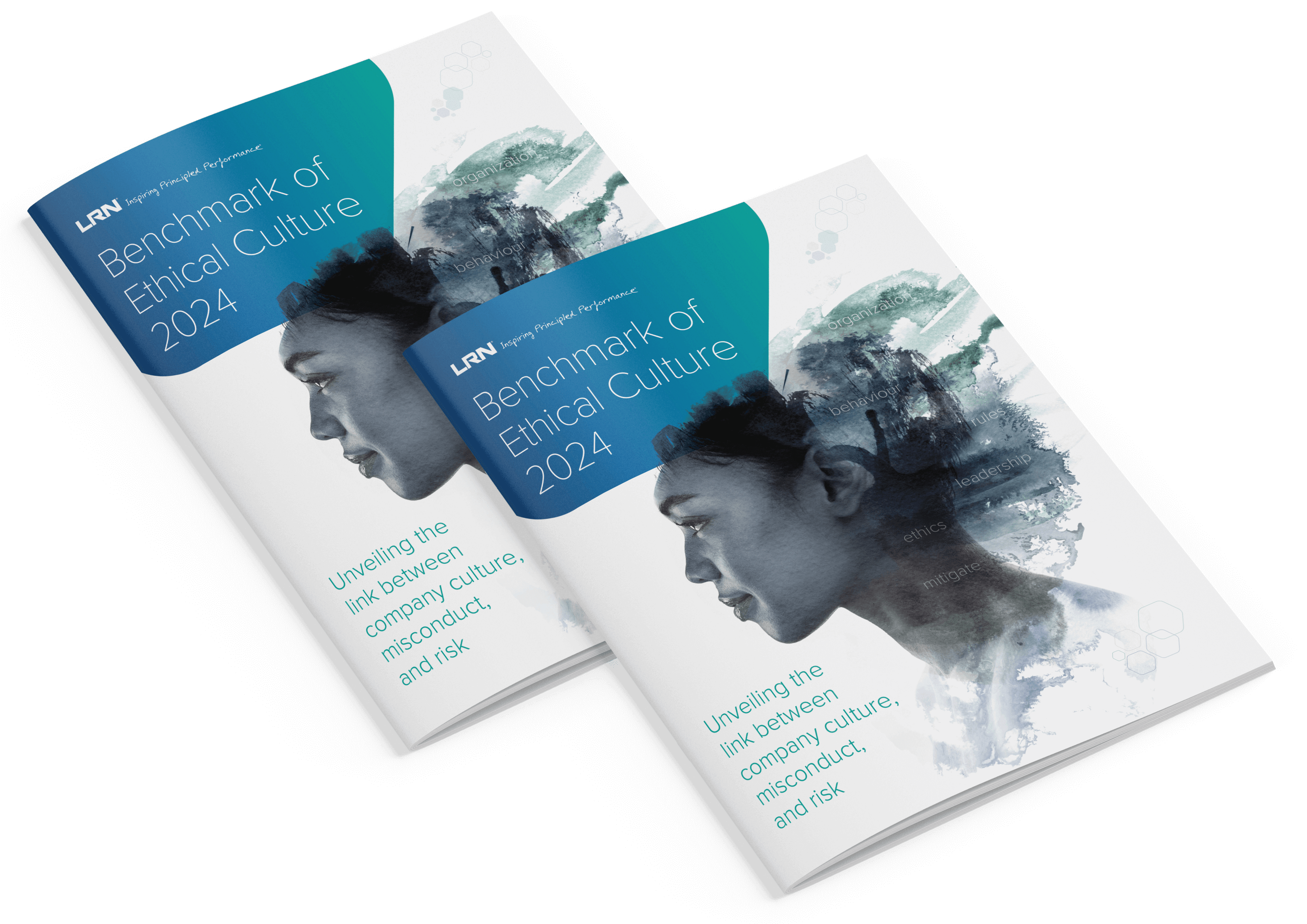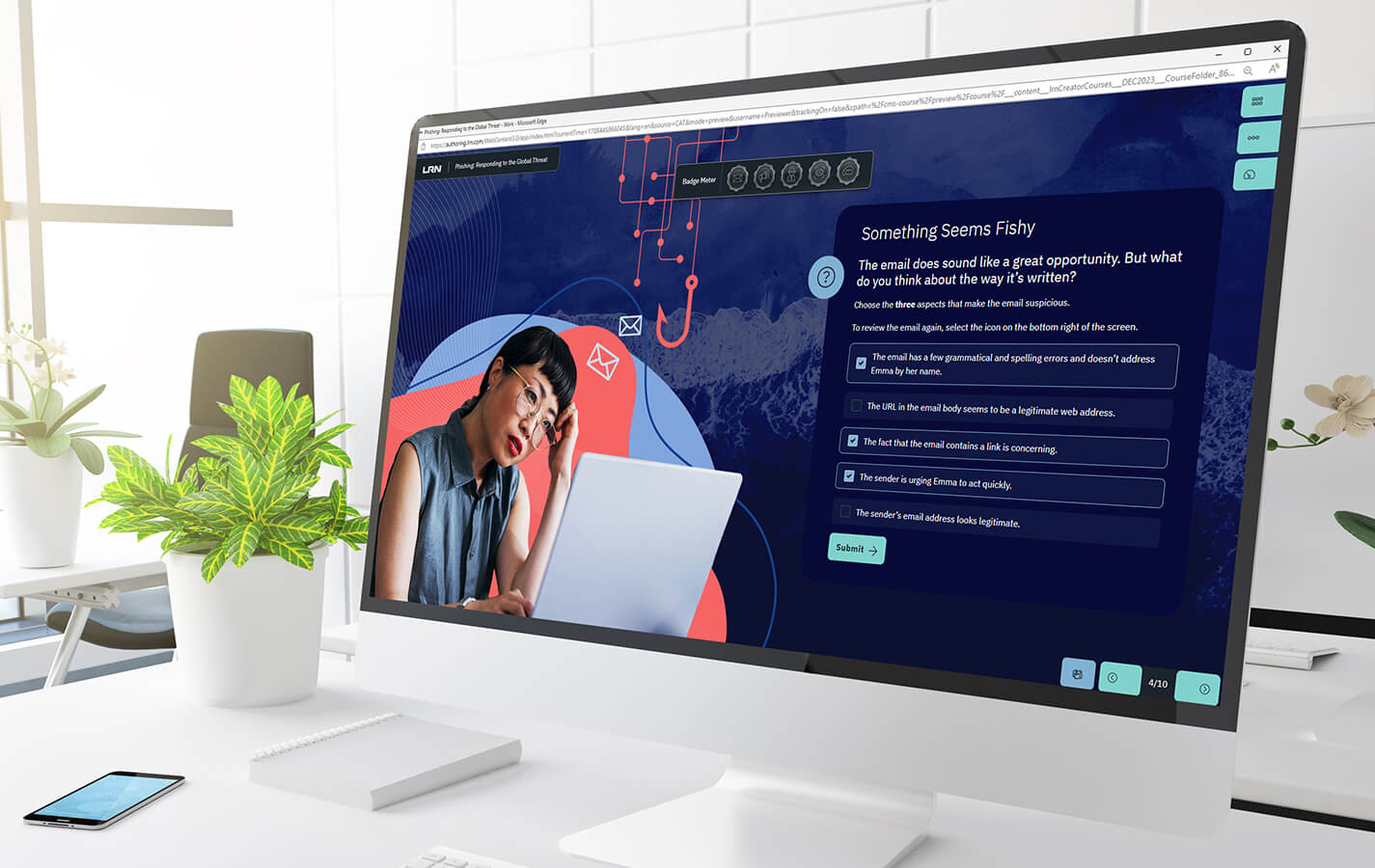Latest Benchmark of Ethical Culture Report finds that top barrier to reporting misconduct is lack of trust in organizational justice systems
NEW YORK (May 13, 2024) – A new report by LRN Corporation, the leader in ethics and compliance (E&C) solutions that enable organizations to inspire principled performance, has found that nearly a quarter (23%) of employees around the world agreed that “it is OK to break the rules if needed to get the job done,” and 14% said they had actually themselves “engaged in behavior that violated their company’s Code of Conduct or standards” in the past year.
Further, 22% of Gen Z respondents said they engaged in unethical conduct in the past year in the workplace, compared with just 9% of Boomers. The results suggest an inverse trend between this mindset and age, with Gen Z 2.5x more likely to agree with breaking the rules than Boomers.
The findings are included in LRN’s latest Benchmark of Ethical Culture Report, which is based on a comprehensive survey of more than 8,500 employees at major organizations and corporations in 15 different countries, and from 13 different industries. The research found that companies with strong ethical cultures have lower rates of observed misconduct and report their observation at a rate 1.5x higher than those in companies with weak cultures (93% compared to 63%). As companies can only address that which they are aware of, this higher level of reporting represents a significant reduction in risk.
Globally, one-third (33%) of respondents said they had observed misconduct or unethical behavior in the past year, with harassment, discrimination, conflicts of interest, and employee health and safety violations cited most frequently. Of those, one-fifth (21%) didn’t report their observation because they didn’t think their company would do anything about their concern (36%) or handle it effectively (30%), or because they feared retaliation (36%). These trends overwhelmingly signal a lack of trust in the system of procedural justice within the organization.
The research also probed employees’ perceptions of Artificial Intelligence and its place in work and on careers. While a slight majority believe AI will have a positive impact, employees who view their companies as adaptive and resilient are nearly 2x more receptive to the potential benefits of Artificial Intelligence on their workplace and career opportunities.
It is generally accepted that culture impacts business results; LRN’s research quantifies that relationship. Companies with strong ethical cultures outperform, by an average of ~50% percentage points more than companies with weak ethical cultures, on a variety of traditional business metrics including customer satisfaction, employee loyalty, competitiveness, innovation, and adaptability. Not only is this gap significant in its size, it represents a meaningful increase from similar research conducted in 2021, which identified a 30%-point performance gap. The performance gap is most pronounced when it comes to a company’s ability to adapt quickly to internal and external change (a critical determinant of resilience): the adaptability of companies with strong ethical cultures is rated 2.6x higher than those from weak ethical cultures. These companies also outperform on business results and innovation at a rate 2.3x and 2.2x higher.
Other notable findings from the report include:
- A large majority (79%) of employees who observed misconduct reported their observation, with most raising their concern to either their direct manager or another manager in the company (77% combined)
- Of all ethical culture measures, psychological safety was the greatest predictor of whether employees would report misconduct they had observed
- Executive and senior leaders are 2.6x more likely to indicate their company has a strong ethical culture than individual contributors and front-line employees, illustrating a stark leadership disconnect with the realities on the ground
- Hybrid employees have more positive perceptions of their company’s ethical culture than their fully in-office peers; they also observe misconduct at a lower rate, and report their observations at a higher rate
- A company’s ethical culture explained a significant proportion (41%) of the variation in an employees’ willingness to stay at their organization, outside of other factors such as compensation, title, or job responsibilities
“Our latest Benchmark of Ethical Culture report shows a clear and encouraging emphasis on reducing misconduct, with the majority of respondents able and willing to report instances of wrongdoing,” said Ty Francis, MBE, Chief Advisory Officer at LRN. “Although this result is positive, it’s also clear that there are several realities organizations need to address, from an evident lack of trust in the system of procedural justice and a worrying proportion of individuals – particularly among Gen Z – not adverse to rule breaking. The generational divide in attitudes towards unethical conduct also needs consideration and attention, with emphasis on the importance of ethical conduct at all levels of an organization, from CEO to trainee.”
“For nearly three decades, LRN has maintained that business performance can only be achieved through the cultivation of an ethical corporate culture,” added Kevin Michielsen, CEO of LRN. “The report findings provide clear evidence of just how true that really is, with the data showing that ethical cultures perform better than those without. Strong ethical cultures also have a big impact on adaptability, a key quality for organizations in a highly complex and increasingly turbulent business environment.”
# # #
About LRN Corporation
LRN's mission and purpose is to inspire principled performance and help people around the world do the right thing. Since 1994, LRN has worked to propel organizations forward with the partnership, knowledge, and solutions to build ethical culture. More than 2,800 companies and tens of millions of learners worldwide utilize LRN solutions and take LRN e-learning courses to help navigate complex regulatory environments and foster ethical, responsible, and inclusive cultures. In partnership with LRN, companies translate their values into concrete corporate practices and leadership behaviors that create sustainable competitive advantage. By acting upon shared values, companies and their people find the means to outbehave and outperform. Learn more at LRN.com and follow on Twitter, LinkedIn, and Facebook.
Media Contacts
Charlotte Hole, Gabriel Oben, Jamie Rollo or Catherine Oswalt, Infinite Global (for LRN)


